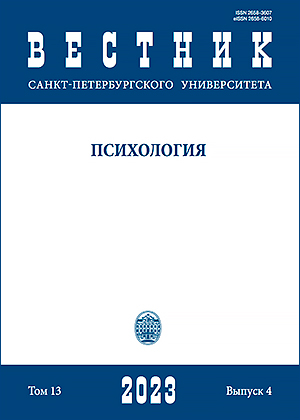Влияние конфабуляций о причинах сделанного выбора на формирование ложных воспоминаний
DOI:
https://doi.org/10.21638/spbu16.2023.409Аннотация
Статья посвящена изучению причин последействия слепоты к выбору на формирование ложных воспоминаний. В исследованиях показано, что после обоснования причин выбора, который люди на самом деле не совершали, они изменяют свои воспоминания в сторону придуманных обоснований (конфабуляций). Цель настоящего исследования — противопоставить объяснение эффекта мнемического последействия слепоты к выбору с точки зрения теории когнитивного диссонанса объяснениям с точки зрения эффектов недавности и вербализации. В эксперименте на материале задачи оценки IQ человека по его фотографии сравнивались ситуации, в которых участник дает обоснование оценке, противоположной той, которую до этого вынес, с ситуациями, в которых участник дает обоснование оценке, противоположной сделанной, но не считает ее собственным выбором. Предполагалось, что, если значимым в проявлении эффекта является конструирование обоснования от первого лица, вызывающее диссонанс, то у участников, считавших, что они обосновывают собственное мнение, эффект искажения воспоминаний после обоснования подтасованной оценки будет более выражен по сравнению с участниками, считавшими, что они обосновывают мнение партнера. На первом этапе участники оценивали IQ девушек по их фотографии, на втором этапе должны были объяснить причины сделанного выбора (либо считая его собственным выбором, либо выбором партнера). Половина предъявленных для обоснования оценок противоречила ранее вынесенной оценке (низкие оценки менялись на высокие и наоборот). На третьем этапе участники должны были вспомнить исходную оценку. Фиксировалось изменение полюса оценки по воспоминаниям. По результатам показан эффект слепоты к выбору. Эффект искажения воспоминаний обнаружен только в группе, считавшей предъявленные оценки собственным мнением.
Ключевые слова:
слепота к выбору, конфабуляции, дезинформация, ложные воспоминания, когнитивный диссонанс, эффект недавности, вербализация
Скачивания
Библиографические ссылки
References
Загрузки
Опубликован
Как цитировать
Выпуск
Раздел
Лицензия
Статьи журнала «Вестник Санкт-Петербургского университета. Психология» находятся в открытом доступе и распространяются в соответствии с условиями Лицензионного Договора с Санкт-Петербургским государственным университетом, который бесплатно предоставляет авторам неограниченное распространение и самостоятельное архивирование.




